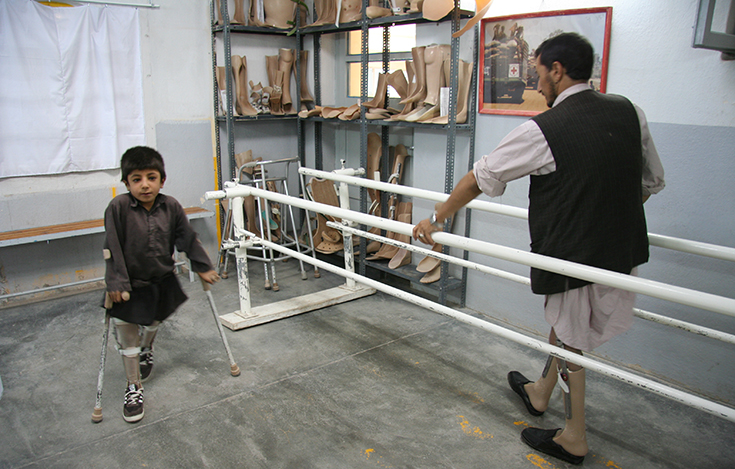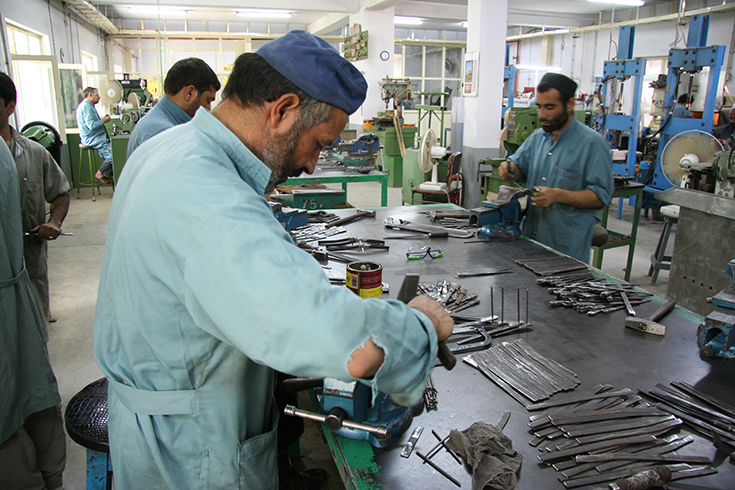Afghanistan: Physiotherapist who helped amputee patients is shot and killed, says ICRC
Lorena Enebral Perez, 38, a Spanish national, was in the ICRC’s rehabilitation centre in Mazar-e-Sharif when she was shot, apparently by a patient. Lorena’s work involved helping children, women and men who lost legs or arms or with many other forms of disability to learn how to walk again or feed themselves.
"She was the heart of our sub-delegation in Mazar," said the ICRC’s head of operations Dominik Stillhart. " She was loved by everybody and this is, of course, devastating news, shocking for all of us, and heartfelt condolences go out to the family of Lorena, as well as to our team in Afghanistan who are in deep shock."
Lorena was remembered by colleagues as having a wide smile and radiant attitude, a professional dedicated to her job and her patients. Afghan authorities have notified the ICRC that the gunman has been arrested.

The ICRC’s orthopaedic project started in 1988 in Kabul. Today it consists of six centres situated in Kabul, Mazar-e-Sharif, Herat, Jalalabad, Gulbahar and Faizabad. Each of the orthopaedic centres has five main activities: Production of leg and arm prostheses; production of orthoses (splints, braces, callipers, corsets...); physiotherapy; social re-integration of the disabled (employment, micro-credit, education, vocational training, apprenticeship); and training of the local staff (only disabled are employed). From the beginning of the programme in 1988 until September 2006, close to 74,000 patients have been registered and have benefited from physical rehabilitation from the ICRC (Oliver Moeckli/ICRC)
The ICRC's physical rehabilitation work in Afghanistan helps people without limbs and with many other disabilities to live an active life through physical rehabilitation, education, employment, and sport. Its seven rehabilitation centres manufacture more than 19,000 artificial legs, arms and other orthopaedic devices a year and treat hundreds of thousands of patients.
The shooting death of Lorena follows the killings in February of six ICRC staff shot in northern Afghanistan; two were abducted in that attack. Her death comes six days after their release, following close to seven months in captivity, and three days after an ICRC truck driver was shot and killed in South Sudan. A spokesperson for the ICRC said: “This string of shootings not only angers and saddens the ICRC community but also underscores the real dangers our workforce faces around the world.”
ICRC staff this year have taken part in a public campaign to remind everyone that its staff are humanitarian workers who seek only to improve the lives of victims of war.
To find out what the ICRC is doing to put an end to attacks on health workers and patients, click here

All the components of the prostheses and orthoses are made in the workshop in Kabul and sent to the other centres. The six centres can produce up to 600 prostheses, 700 orthoses, 1,200 pairs of crutches and 100 wheelchairs a month. Originally intended for war wounded disabled only, from 1995 the assistance has been extended to any kind of motor disabled, either war wounded or non war wounded. At present, the main pathologies are: loss of limbs, poliomyelitis, spine injuries, congenital deformities, cerebral palsy and any other deformity (Oliver Moeckli/ICRC)